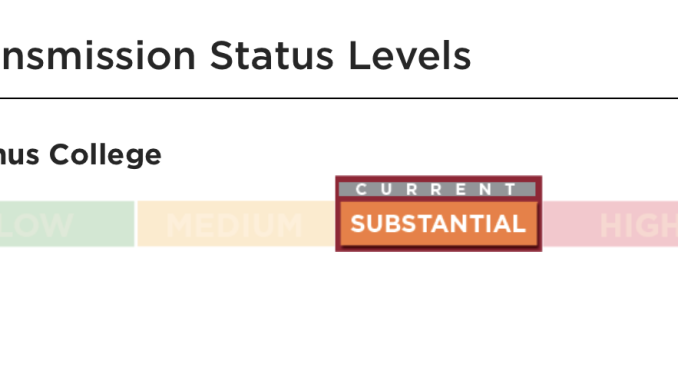
Marie Sykes (masykes@ursinus.edu)
Across campus and the northeast, Covid cases have once again gone up thanks to the latest BA.2 variant. After the lifting of the mask mandates and relaxation in protocols, what does this mean for the Ursinus student body?
When asked what Ursinus is doing to reduce the spread of Covid, Interim President Jill Marsteller said the school is doing the same things it has always done: “testing, isolation, and [masks].” Although students are concerned about the possibility of a lockdown – or really any change in COVID policies – the administration “believe that our strong encouragement to use masks in indoor spaces, coupled with other mitigation measures, will be sufficient to reduce the number of transmissions and infections.”
Because the spike in cases came a bit more than a week after masking became optional, one question on some students’ minds is whether the policy change was a good idea in the first place. The student body seems to be split on the answer, but with masks being reinstated in most classes by professors, individuals have been able to choose the environments they want to put themselves in.
Some still worry the decision to go mask-optional was made too quickly. Dean Missy Bryant sent an email on March 15 stating “until such time as we can get essentially every student tested, indoor mask mandates on campus will remain in place.” Between March 11 and 18, roughly 800 tests were administered on campus with 300 tests on March 18 in order for registered events to not be canceled. Factoring in our student population of 1500, repeat testing, and faculty testing, it was still far from “essentially every student.” Roughly half were tested, with only 0.2% testing positive. On March 21, 2022, Ursinus went mask-optional for the first time since the beginning of the pandemic.
Admitted Students Day was held in the midst of the increase in cases, to the consternation of some students. Additionally, some professors are testing positive as well. Since the beginning of this semester, faculty have been required to vaccinate. According to Schneider, the school also “strongly recommend(s) weekly testing” although many professors test from home. The school does “not make an effort to track faculty and staff testing as carefully.” Roughly 5% of tests in Myrin are faculty and staff tests.
The school administration wants to stress that Ursinus’ current spike is similar to what other nearby campuses and the northeast as a whole are experiencing as a result of the BA.2 subvariant of the Omicron strain. As a result, nothing more than stronger recommendations for masking and testing will be done by the school – there is no lockdown or other policy change in sight. Marsteller tells us that a lockdown’s effectiveness is “doubtful” especially as “transmission happens most commonly in the residence halls” and “confining students to their individual rooms for an extended time is unhealthy and unenforceable.” She said, “we work hard to do what is right by our students. The evidence thus far—from this outbreak and from previous instances—suggests that weekly testing, contact tracing, isolation and quarantine can effectively bring the cases under control.”
The issue of testing and the spike in positive cases was brought up at the student government’s town hall meeting on April 6. UCSG and Student President Jalen Everette ‘22 issued the following statement to the student body: “Student Government is constantly working with the school and the virus task force to help create a safe environment for everyone. We encourage everyone to get tested to help maintain the health of the campus.”
One student who was part of the recent spate of positives, Jake Herbetko ‘22, commented that he felt “the school wants to put forth how diligent they are with testing enforcement, but they aren’t as much as they think.” The school sends out weekly emails saying that testing is “required,” but relies on the honor system, which he says “certainly doesn’t incentivize it.” Herbetko thinks contact-traced students should have a stronger requirement. Another student, Kate Foley ‘23, thought it was a “horrible idea” especially since it was only when the school threatened to cancel registered events one weekend was the “only time when tons of people went to test,” and suggested canceling events whenever testing numbers were too low as the “easiest and most motivating consequence” to get people to test regularly.
Please, for the sake of the student body, graduation, and everything fun to come in the next few weeks, continue to get tested, even if it’s “just allergies.”
